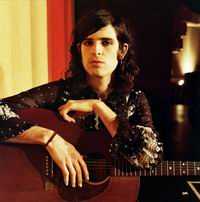“…Banhart was born in Texas in 1981, and named by an Indian mystic whom his parents followed. When his folks divorced two years later, he moved with his mom to Caracas , Venezuela , where he was raised amidst the shanties and sweatshops. Though his family had enough money to stay above the poverty line, life wasn't easy.
" Venezuela was insane," says Banhart. "You don't go out after 8 because it's too dangerous. You don't wear nice sneakers because, while here you may get assaulted, there you just get killed."
When Banhart's mother remarried, his stepfather moved the family to Los Angeles . In the fall of 1998, having written songs since he was 12, Banhart left home to begin school at the San Francisco Art Institute, with a hefty scholarship. Though he was instantly disillusioned with the constraints of academic art, his environs took him in more productive directions.
Living in the lower Castro, he was tapped by his roommates -- a gay couple whom Banhart refers to as "Bob the Crippled Comic and Jerry Elvis" -- to play two classic songs at their wedding: the gospel hymn "How Great Thou Art" and Elvis Presley's "Love Me Tender." Touched by the request, Banhart found himself newly inspired.
Shortly thereafter, he had a second epiphany. While vacationing in Bish Bash Falls , a state park in Massachusetts , Banhart and his girlfriend were quarreling about the Rolling Stones.
"The argument was about [the song] 'Street Fighting Man,'" he says. "And I'm like, 'That's bullshit. Mick Jagger wasn't fighting nobody.' And she was like, 'Well, how do you know? Maybe they just made it up.' And I was like, 'Well, I can make up a song about something!' And it turned out to be this little song ..."
Banhart proceeds to sing, limerick-style: "There once was a man who really loved salt/ So he tied his nose to the sea/ And then God came down from his silver throne/ And said, 'Honey, that water ain't free.'"
"That's when I realized I could write about anything I wanted," he adds casually. "It was like being constipated and then taking a suppository."
Thus began Banhart's days as a wandering minstrel. When he returned to San Francisco , he began playing anywhere that would have him, be it an Ethiopian restaurant, an Irish pub, or Du Nord's weekly "Monday Night Hoot."
"We had to pretend like he was just helping us with equipment and then sneak him in," says Eric Shea, host of the "Hoot." "He was too young to get into the club."
In the summer of 2000, Banhart dropped out of art school and moved to Paris . There, he was discovered by the owner of a small club, who chose him to open shows for indie rock bands. All the while he was recording songs, both on a borrowed four-track and on a friend's answering machine.
Moving back to the United States in the fall, Banhart bounced between San Francisco and Los Angeles . At a gig at the Fold in L.A. , Banhart was doing a sound check when Siobhan Duffy overheard his set. A lover of old bluegrass and folk music, Duffy is also a close personal friend of Michael Gira, the one-time frontman for New York gloom-rock legends Swans and current owner of Young God Records.
"She couldn't believe it," says Gira of Duffy's reaction. "So [Banhart] gave her a CD-R, and I listened to it and had the same response. His voice is so unique, his songwriting is just amazing…"
Source: http://www.younggodrecords.com/Artists/DevendraBanhart/
